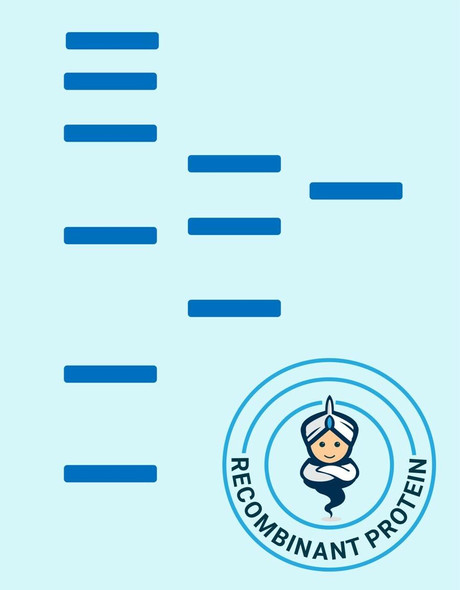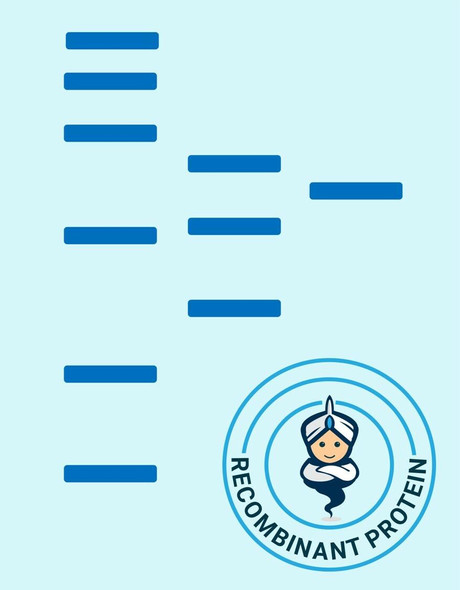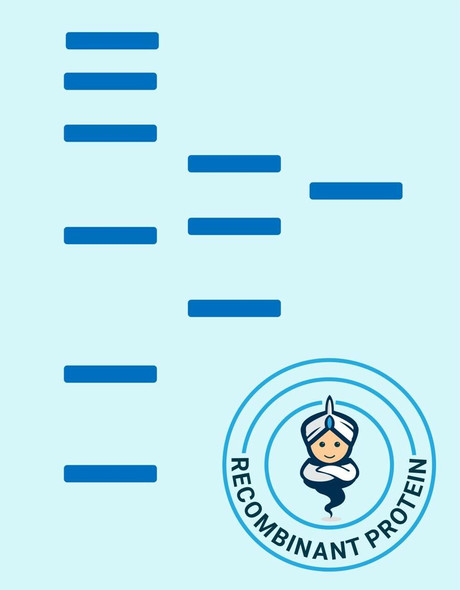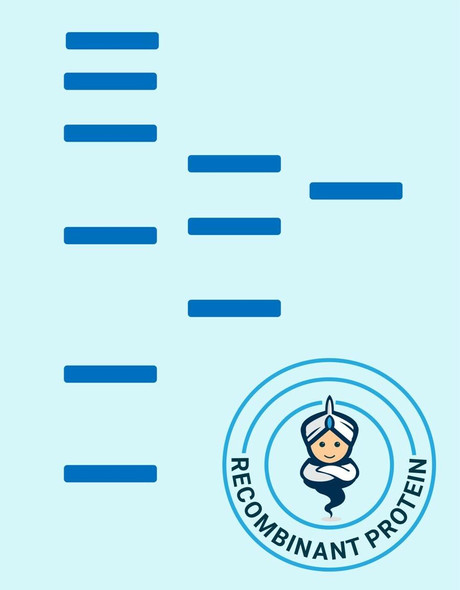Description
| Product Name: | Human AMT Recombinant Protein |
| Product Code: | RPPB1401 |
| Size: | 20µg |
| Species: | Human |
| Target: | AMT |
| Synonyms: | GCE, GCST, GCVT, NKH, Aminomethyltransferase,mitochondrial, Glycine cleavage system T protein, GCVT. |
| Source: | Escherichia Coli |
| Physical Appearance: | Sterile Filtered colorless solution. |
| Formulation: | AMT protein solution (1mg/ml) in Phosphate Buffered Saline, 30% glycerol and 1mM DTT. |
| Stability: | Store at 4°C if entire vial will be used within 2-4 weeks. Store, frozen at -20°C for longer periods of time. For long term storage it is recommended to add a carrier protein (0.1% HSA or BSA).Avoid multiple freeze-thaw cycles. |
| Purity: | Greater than 90.0% as determined by SDS-PAGE. |
| Amino Acid Sequence: | MGSSHHHHHH SSGLVPRGSH MGSAQEVLRR TPLYDFHLAH GGKMVAFAGW SLPVQYRDSH TDSHLHTRQHCSLFDVSHML QTKILGSDRV KLMESLVVGD IAELRPNQGT LSLFTNEAGG ILDDLIVTNT SEGHLYVVSNAGCWEKDLAL MQDKVRELQN QGRDVGLEVL DNALLALQGP TAAQVLQAGV ADDLRKLPFM TSAVMEVFGVSGCRVTRCGY TGEDGVEISV PVAGAVHLAT AILKNPEVKL AGLAARDSLR LEAGLCLYGN DIDEHTTPVEGSLSWTLGKR RRAAMDFPGA KVIVPQLKGR VQRRRVGLMC EGAPMRAHSP ILNMEGTKIG TVTSGCPSPSLKKNVAMGYV PCEYSRPGTM LLVEVRRKQQ MAVVSKMPFV PTNYYTLK |
Aminomethyltransferase, mitochondrial isoform 1 (AMT) is a component of the glycine cleavage system termed T-protein. AMT reversibly catalyzes the degradation of the aminomethyl moiety of glycine attached to the lipoate cofactor of H-protein, leading to the production of ammonia, 5,10-methylenetetrahydrofolate, and dihydrolipoate-bearing H-protein in the presence of tetrahydrofolate.
AMT Human Recombinant produced in E.Coli is a single, non-glycosylated polypeptide chain containing 398 amino acids (29-403 a.a) and having a molecular mass of 43.3kDa.AMT is fused to a 23 amino acid His-tag at N-terminus & purified by proprietary chromatographic techniques.
| UniProt Protein Function: | AMT: The glycine cleavage system catalyzes the degradation of glycine. Defects in AMT are a cause of non-ketotic hyperglycinemia (NKH); also known as glycine encephalopathy (GCE). NKH is an autosomal recessive disease characterized by accumulation of a large amount of glycine in body fluid and by severe neurological symptoms. Belongs to the GcvT family. 3 isoforms of the human protein are produced by alternative splicing. |
| UniProt Protein Details: | Protein type:Amino Acid Metabolism - glycine, serine and threonine; Energy Metabolism - nitrogen; Methyltransferase; Mitochondrial; EC 2.1.2.10; Cofactor and Vitamin Metabolism - one carbon pool by folate Chromosomal Location of Human Ortholog: 3p21.31 Cellular Component: mitochondrial matrix; mitochondrion Molecular Function:aminomethyltransferase activity Biological Process: glycine catabolic process; glycine decarboxylation via glycine cleavage system; glyoxylate metabolic process Disease: Glycine Encephalopathy |
| NCBI Summary: | This gene encodes one of four critical components of the glycine cleavage system. Mutations in this gene have been associated with glycine encephalopathy. Multiple transcript variants encoding different isoforms have been found for this gene. [provided by RefSeq, Sep 2011] |
| UniProt Code: | P48728 |
| NCBI GenInfo Identifier: | 1346122 |
| NCBI Gene ID: | 275 |
| NCBI Accession: | P48728.1 |
| UniProt Secondary Accession: | P48728,Q96IG6, A8K3I5, B4DE61, B4DJQ0, E9PBG1, |
| UniProt Related Accession: | P48728 |
| Molecular Weight: | 41,780 Da |
| NCBI Full Name: | Aminomethyltransferase, mitochondrial |
| NCBI Synonym Full Names: | aminomethyltransferase |
| NCBI Official Symbol: | AMT�� |
| NCBI Official Synonym Symbols: | GCE; NKH; GCST; GCVT�� |
| NCBI Protein Information: | aminomethyltransferase, mitochondrial |
| UniProt Protein Name: | Aminomethyltransferase, mitochondrial |
| UniProt Synonym Protein Names: | Glycine cleavage system T protein |
| Protein Family: | Probable ammonia channel |
| UniProt Gene Name: | AMT�� |
| UniProt Entry Name: | GCST_HUMAN |








